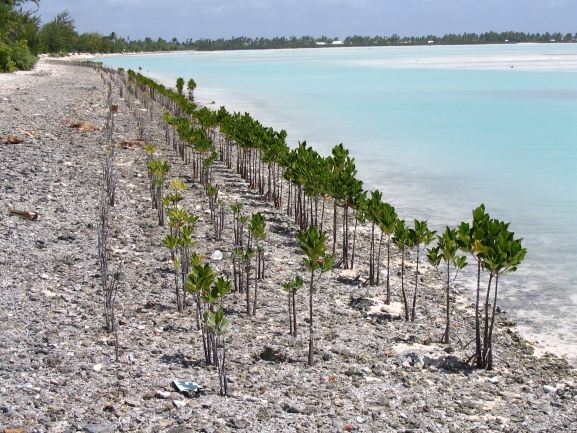A major evaluation of climate adaptation projects in the Pacific argues that bottom-up, community-led projects have performed better than many top-down, donor-driven initiatives.
The study, published in the prestigious journal Nature Climate Change, reports that “locally funded initiatives and those implemented by non-governmental organisations were more likely to perform better, and climate awareness raising initiatives and those integrated with ecosystem-based adaptation performed best.”
The research team was led by Professor Karen McNamara of the University of Queensland and Professor Patrick Nunn of the University of the Sunshine Coast. The team evaluated climate adaptation projects in twenty rural communities across four Pacific countries – Federated States of Micronesia, Fiji, Kiribati and Vanuatu – allowing comparison between low-lying atoll nations, high island states or those with both features.
The adaptation projects at community-level addressed a range of issues: enhancing food or water security; prevention of land loss; community relocation; climate change awareness raising; marine resources protection; and enhancing financial security.
For lead researcher Patrick Nunn, the best outcomes were found when projects are appropriate to local context, tailored to cultural specificities as well as community priorities, resources and livelihoods.
Nunn is well known in the region, working at the University of the South Pacific (USP) for 25 years. He was appointed to a Personal Chair as USP Professor of Oceanic Geoscience in 1997. Since 2014, he has worked as Professor of Geography at the University of the Sunshine Coast in Queensland, Australia. Nunn has now been appointed as lead author of the ‘Small Islands’ chapter for the next 6th Assessment Report of the Intergovernmental Panel on Climate Change (IPCC), the main scientific body that reports to the global climate negotiations.
He noted: “Our study recommends four inter-dependent priorities for future community-based adaptation initiatives: local approval and ownership; shared access to and benefit from initiatives; integration of local realities; and systems-thinking and forward planning.”
In collaboration with the Pacific Conference of Churches, WWF Pacific, Conservation Society of Pohnpei and the Red Cross Red Crescent Climate Centre, the evaluation looked at community projects across the region funded by different donors and managed by different organisations.
To read more subscribe to Islands Business magazine
